Yesterday I had dog on the brain. I was absolutely incapable of accomplishing anything else. My brain was foggy, scattered, and every time I tried to get it in order I was attacked by dog. Here's why: Meet Sanka, our newly adopted three month old puppy. They told us at The Animal Humane Society that he is a Dachshund Chihuahua mix, but really I don't believe them at all. I haven't actually measured his legs, but I swear they're at least a foot long. No way he has any Dachshund in him. So we're thinking maybe there's some Italian Greyhound in there, but really we have no idea. He weighs about 8 lbs now, and I imagine as/if he gets bigger we'll have a better idea of his breed(s). Really though, it doesn't matter.  Because when you're this cute, it doesn't matter what kind of dog he is or how big he gets. (Especially since, at the very least we know he won't be much bigger than 30 lbs. And that much, we can handle.)
Our other dogs weren't too sure about this little one at first. (And yes, I said dogs, plural.) As you can see, Tulo is still living with us and he doesn't look too happy about our new visitor. We are currently fostering Tulo, working on his 'living in a house' skills and general training. As you can see, he has begun to make himself quite at home. (If anyone is interested in this little guy, please let me know! He's completely house broken, loose leash trained, comes when he's called, and loves to play with other dogs.) Mostly, he loves to snuggle, which leads me to this: The perfect place for my two newbies while I'm working. You can just see Koda's nose out of the picture on the bottom right. For a while, I couldn't even get Koda to sit still long enough to get a photo of her. She is stinkin' cute, but she HATES having her photograph taken. No, really. Also, I think she's protesting the presence of another lap dog in HER lap, but she warmed up eventually. If you can call wrestling "warming up". 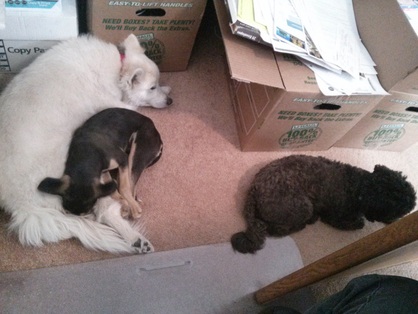 This is the closest they'll get if my lap isn't part of the equation. But, we've only had Sanka for two days, so I think this is wonderful.
Sorry again for not posting yesterday, but as you can see I quite have my hands full. There were a few moments yesterday when I suddenly felt like a mother outnumbered by her children. You know, you're coasting along with two (assuming there are two parents in the household) and you think you've got it handled, so you say 'hey, this is fun, let's have another' only to figure out too late that having a third totally throws off the ratio? Yeah, it's kind of like that, or at least the closest I can come to imagining that since I have no children of my own.
Puppy Preschool starts in two weeks. I wonder if we'll all make it that long!
According to the National Institute of Mental Health, 26.2 percent of Americans over 18 suffer from a diagnosable mental disorder in any given year. One in seventeen Americans suffers from a severe mental illness. As of 2012, among veterans, there are more suicide deaths among active duty soldiers than combat deaths. According to a new report issues by the Department of Veterans Affairs, every 65 minutes a military veteran commits suicide. Thirty one percent of these were committed by veterans under the age of 50. ( Suicide Rate Among Military Jumps)
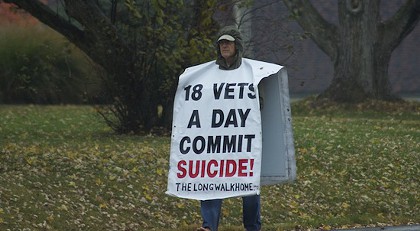
A veteran protests the veteran suicide rate, which just jumped from 18 to 22 a day
Today, I went to a doctor's appointment. This appointment was made for me by the powers that be over a month and a half ago, after many phone calls and much grief, so I could get established with a new psychiatrist since Erik and I moved back to New Mexico. I arrived at the appointment today to find out that the doctor was a psychologist (therapy) and not a psychiatrist (medication). I already have a counselor. I need my medications managed.
When a person is in a mental health crisis and tries to get help, they frequently get put on hold, stuck in a waiting room, or otherwise thrown into a holding pattern. In case it's not obvious, a holding pattern is exactly the opposite of what a person in crisis needs.
I am sure that I am preaching to the choir here, so I won't go on much more. But just in case my point isn't clear yet, our mental health care system is even worse off than our medical care system. If behavioral health is covered (and this is a big if), it takes weeks, if not months to receive proper care. Once care is received, the medications are frequently not covered by insurance companies, and we are not talking about inexpensive meds. And then there is the continued management necessary to properly care for people with mental health issues, counseling, regular medical check-ups and check-ins. Sometimes this includes blood tests and other exams. If all of this is not completed on a regular schedule, patients get thrown off their schedule's of therapy and medication, symptoms worsen and this is where we start to lose people. They drop out of care, fed up with a system that doesn't work, or they give up on life all together.
Our veterans, our mentally ill, need our help. Visit Change.org to sign a petition that urges lawmakers to improve mental health care.

As people who have direct, lived experience with mental illness and addiction, as family members caring for our loved ones with these illnesses, as counselors and health care workers, and as leaders of behavioral health programs, we all call on you, the leaders of our Nation, to begin with us a road to recovery from the Newtown Tragedy.
Visit the new Veterans Crisis Line website to see how you can help save our veterans once they've left the battle field.
This week has been frustrating, challenging, and difficult. It's only Tuesday.
I apologize for not posting yesterday. The day just escaped me. You know those days, the days when you're getting into bed and all of a sudden you realize the day is over and you have no idea how you get there.
My whole weekend was like that and it bled right into Monday. Today was headed that way until I decided about two minutes ago that I was going to stop the day right in its tracks and catch up.
Luckily, I found out earlier today that I will be uncharacteristically home on Thursday and so that means I don't have to sit here at the computer banging my head against the wall trying to get this project to work while technology refuses to cooperate. I have the luxury of just stopping. I will come back to it tomorrow. I have time. And maybe, just maybe, by taking the time to let myself catch up with the events of the last few days I will also be able to stop the anxiety that has been snowballing and threatening to build until it crumbles me like a tsunami.
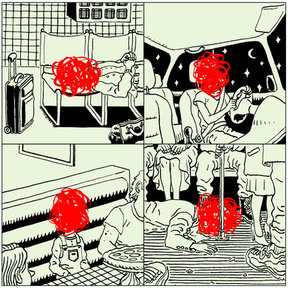
Subject appears anxious.
Erik calls to tell me he's on his way home from work; my time to catch up will be short lived. I'm glad he's coming home, but with his arrival comes a host of expectations that I cannot handle right now. I did not get any time to just be today. So he will come home and make dinner. I will feel bad, because really, he's been at work all day and should be the one who gets to come home and just be. The guilt will snowball into feelings of worthlessness ----> thoughts providing evidence of that ---> deepened depression ----> anxiety about what I should have done/be doing/will have to do tomorrow ----> more anxiety/depression.
I am going to log off now. Go sit in a comfortable spot and try to catch up without letting the vicious cycle above spiral out of control. In the mean time, here's an interesting series the NY Times is doing on anxiety. Check it out. 
 The other day, a good friend of mine mentioned that her husband reads my blog, enjoys it, and even identifies with it. He also said that no one will post comments or answers to my questions, because no one wants to admit that they have struggled with mental illness. I understand. I didn't ask for help until I was in college. I didn't want to admit that I felt like my life wasn't worth living, even though I was otherwise healthy, well-fed, warm, and had people who loved me. We all hide our sadness or fear or anger, because somewhere along the way we learned that it makes us less than. But the truth is, something we all share cannot divide us, no matter how hard we try. Mental health issues have been all over the public sphere in the last couple of years with the prevalence of gun violence. But when we talk about gun violence, we are talking about the 1 in 17 adults that suffer from a severe and often psychotic form of mental illness. This statistic is scary enough and certainly significant and important, but we must also consider the 26.2 percent of Americans over 18 that suffer from a mental disorder in any given year. ( NIMH)
One in four people have a diagnosable mental health illness: mild depression, anxiety, mood swings, etc. When we talk about mental health, we are not simply talking about those that suffer from more severe forms like schizophrenia, bipolar disorder, crippling obsessive-compulsive disorder and the like. We are talking about people who get sad in the winter, who shake when they talk in front of people, those who struggle to manage their anger, anyone addicted to anything (alcohol, video games, exercise, food), and the list goes on. "Mental Illness" is a label in and of itself that is helping keep this issue in the dark.
So let's stop talking about "mental illness", "depression", "anxiety." And let's start talking about the problems we all face, about what we have in common. One in four adults in America suffer from a diagnosable mental illness, but we all have been sad, scared, lonely, overwhelmed, angry, ashamed, deeply disappointed, among other things.
 If you have a diagnosis and you want to talk about it, that's fantastic. Join me! I have diagnosed mood, personality, and anxiety disorders. But what does that really mean? Sometimes I get sad, scared, lonely, overwhelmed, angry, ashamed, and disappointed. This is what we have in common. This is what really matters.
Getting mental health issues out into the open isn't about labels and distinctions. I know that depression and sadness, nervousness and anxiety, are not the same thing, but it is important that we remove the stigma from mental suffering. I have never met a person who hasn't suffered internally in some way. So why are we so afraid?
If you know someone who has felt any of these things, please share, comment, or like this post on facebook. Let's see how connected we are.
I read a blog called The Write Practice. There are many different bloggers, but every Wednesday Suzie Gallagher posts a "Words on Wednesdays" exercise, "as a way to improve our vocabulary and practice our writing at the same time." This week's word was nook: a corner or recess, especially one offering seclusion or security. Nook is a great word. I started seeking out nooks in my world when I was very young. When I was little, my dad, the wood worker, built my sister and I these beds. They were the height of bunk beds, but instead of a bed on the bottom, there were drawers, three on the left, three on the right, and in the center a door that doubled as a ladder. Behind the door, there was a T-shaped storage space. Like most younger siblings, I was excited about finally getting to sleep up high, having my own room (though I think this happened a few years earlier), but more than anything, I was excited about the nook under my bed.  It looked kind of like this, except the wood was lighter, it had three drawers on each side, it was higher, and the door in the middle had horizontal slats that acted as a ladder. While the bed was being built, I spent hours imagining how I would use it, what I would put under there, how I could disguise the fact that it was really my secret hideout. When I finally got the bed, I put all my favorite stuffed animals, books, extra pillows, and blankets in the back two corners and all my shoes in the front part, just inside the door. I would crawl over the shoes to get to my corner, turn on my flashlight, and just sit and appreciate the small, dark space. I had toys and books, but when I went in there it wasn't because I wanted to play; it was because I wanted to feel safe, enclosed, comforted. The nook was my escape.
When my parents built an addition and I moved into a completely new room, with a new bed and no nooks to speak of, I asked my dad to build me a door that was also a bookcase on the inside. When I closed the door to my room, it looked like there was no door. I didn't have a small, dark space, but I had the illusion of being away, enclosed. Later, when my sister went to college and I moved rooms again, I had an L-shaped desk that was build into the wall. It wasn't ideal, but I carved out a nook in one corner hidden by the desk chair.
After we sold that house, I moved into a giant room that had a closet without shelves. The doors slid side-to-side, and one half became my nook. By this time, I had a few specific things that always transferred from one hide-a-way to the next: a stuff animal, a blanket, a great big pillow. I was sixteen when we moved into this house and I soon realized it wasn't "normal" to have a nook like mine. So after a while, I stopped using it and turned to other comforts.
A couple of years ago when I was at the bottom of a depression cycle, my husband, having heard about my nooks, took a big stuffed elephant, a pillow, and some blankets and carved out a nook in one corner of our walk-in closet. It felt silly at first, but when I finally acquiesced and crawled into the small, dark space I felt safer than I had in a very long time.
We all have coping tools, some more healthy than others. Many of us have coping mechanisms we would be embarrassed to talk about. "Hi, My name is Terryn Rutford and I like to hide in closets."
If you would like to share your coping mechanism, but you don't want to tell us who you are, feel free to post as Anonymous and use a fake email address. Sometimes it feels good to tell the truth, even under the cover of darkness.
 - T
In my last post, I discussed an assignment my counselor had given me. He asked me to describe my sadness. I believe he was looking for some quantification of my depression, in order to better understand how it is for me; because truly, it is different for everyone. This is what I wrote for my counselor. This is a brief look into what it's like for me. Everyone's mental illness is different; some people may see themselves in my words, many will not.
Always I convince myself there is a reason - this or that is causing my sadness and if I could just fix it, then the sadness would go away. New friends, more money, a relationship, a better job, understanding from my peers, weight loss, success, and on and on. But throughout my life I have had each of these things at one time or another, sometimes many of them at the same time and they created no lasting happiness.
The sadness is a weight, a pall cast over my day. It will never lift and I will never be free. The only way out is to fill the silence with absorbing distractions, TV or books or sleep or self-destructive habits. The company of others only makes it more difficult at these times because they do not fill the silence and I feel guilty for being such a blob.
There are other days when it feels like I could out run the sadness if I just keep moving, keep doing. Then the sadness feels more like a specter waiting in the wings. When I pause to reflect or notice my surroundings it creeps up, tears threaten. And I must begin to move again or I will descend into that other drowning sadness. The one from which it is so difficult to escape. I must stay outside myself in and out of the moment at the same time; focusing on the task, any task, only the task.
And that is the feeling an overwhelming amount of the time. The sadness can be lifted and distracted by friends, family, tasks, general busy-ness. These are the good days when I appear the most "normal," the happiest. These are the days when it most feels like everything will be okay and life will go on.
It is the other days that I dread, that stalk me through the quiet moments and descent without warning. Life feels meaningless and pointless during those times, a merry-go-round I'm supposed to be happy riding my whole life.
And always the sadness makes me question the point of it all. Why are we here? What is our purpose? What is my purpose? If the world ended tomorrow would the universe care? I am just not sure that I see the point of existence.
I looked back through old journals and poetry written over the last ten plus years. Entries popped up again and again questioning who I am, questioning my purpose, my personality. I've wondered over and over how to define myself, what is truly me and what I steal from the people I spend the most time with.
"She's afraid to think, afraid to be at rest. She must occupy her mind with stories and games and schedules she can't possibly keep up with. If she stops she's afraid she'll lose her sanity and that she won't. She's afraid she'll actually have to deal and the reality of her isolation makes that unbearable."
"She's missing pieces inside."
"I expected to fit somewhere, to be something instead of nowhere and nothing."
"I am almost always quick to anger. When people say things I don't want to hear for any number of reasons, when they ask questions but then can't understand the answers, when they ask questions to which I don't know the answers, when they ask questions to which I don't have the energy to explain, etc. I am short-tempered, easily agitated, quickly frustrated. I feel invaded, unable to express what I'm feeling, disjointed, disconnected, deeply misunderstood. Things I have no right to feel. And so, when I act out on these things by becoming angry, silent or frustrated I create a problem where none exists and in turn make the other person equally upset. It is my fault." December 2003
"My chest feels like it's closing up, it's difficult to breathe. My head is pounding not a headache but something different, something harder to place, elusive like a fog. I feel helpless, more hopeless and pointless than I ever could've imagined. I feel constricted, like the room is closing in on me, like I'll be swallowed up by it and no one will notice." October 2003
"I have nothing that defines me. When asked what words best describe me I am stumped. There is nothing, therefore I am nothing. All I know of who I am is who I am when I am with other people." July 2003
"I am shaking from the inside out. You don't find me here. You don't know me here. I am not clean. i am not lucid. I am not safe from myself from you fro anyone. I am not hiding. I am not seen. My eyes are not open. My voice is not heard. I don't know myself. I don't know who I am and as soon as I figure that out this will all get better. This is who I am, but who is this. Is this midnight writing to no one for nothing? Is this all i am. It can't be. There i so much more, but no words, no place to stay, no life of my own. I have been following, pretending, moving on whims. I am not sure what is mine and what is everyone else's. I am not sure what it is I am doing here." April 2005
And so more themes, not knowing myself, not knowing who I am. And the sadness and confusion that goes along with that. Then there is the desire to feel physical pain, to bring the internal outward. It comes up over and over again. My experience from month to month, even day to day, is not always the same, but the sadness has always been there in some form. This is a snapshot of my depression. Would you like to share a snapshot of yours?
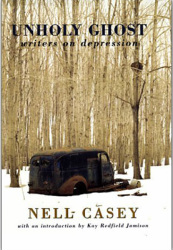 A couple of weeks ago, my counselor gave me an assignment. He asked me to describe my sadness, in writing. For those of you who have experience with depression, you know that at times when you are out of the depression, it can be hard to remember exactly what it felt like or to put it in words. I believe he was looking for some quantification of my depression, in order to better understand how it is for me; because truly, it is different for everyone.
As I sat down to complete this assignment, I was reminded of the hours I spent in my youth compiling endless lists of quotes on depression from other writers. There is a book called Unholy Ghost: writers on depression that I have read and re-read since I was a teenager. In the beginning, every time I read it, I would highlight passages in a different color and there is a key inside the front cover matching the color with the number of readings. After a while though, I ran out of colors and it is anyone's guess when the passages were highlighted.
My goal, though, in marking various passages was to find one, finally, that might make what I was feeling clear to my family, that might bring some awareness and clarity. I did not trust my own words to be adequate; I did not think that my family would believe the depths of the pain I felt if it came from my own pen. I would re-type passage after passage, creating a catalog of others' pain. But I never could gather the courage to actually hand it to anyone in my family. Until a couple of weeks ago, I had never been asked to describe the sadness. I had long since given up hope of ever being asked.
So I put this to you: Ask someone. If there is someone in your life you know struggles with mental illness, ask them what it's like and be ready for the answer. Because it's not pretty or romantic; it's not melancholy or artistic. And no matter what you know about them, no matter how simple, easy, or uncomplicated their life may seem, do not judge them. Simply listen. And maybe, just maybe, if the person is ready, describing it might help just a little. Or perhaps, if he or she isn't ready, they will know that if they ever do want to talk about it, you'll be there ready to listen.
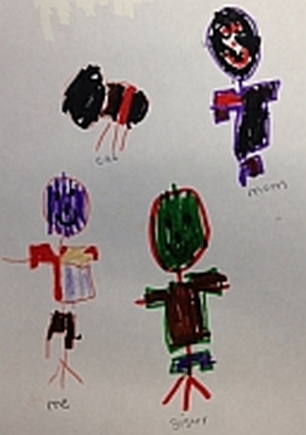
A 7-year old caucasian boy shows how he sees himself and family in very dark colors. He suffers from anxious depression, a disorder with which his mother also suffers. From the Journal of Developmental & Behavioral Pediatrics Click on the picture for a link to the article.
According to the National Alliance on Mental Illness, one in four adults - approximately 57.7 million Americans - suffer from mental illness in any given year. It also states that only one-third of those suffering receive treatment. Mental Illness: Facts and NumbersIn 400 B.C. mentally ill people were treated scientifically and taken care of at home by their families. The Middle Ages brought the belief in demons as the logical explanation for mental abnormality. Exorcism was the course of treatment. Over the next 1500 years, people with mental illness were progressively shunted into the dark, dropped in mental institutions, mistreated, and ignored by society. In the last 100 years, mentally ill people have taken up the ranks of the homeless and imprisoned, while the mental institutions are overrun, overworked, and understaffed. Timeline: Treatments for Mental IllnessBeyond the statistics and realities of what we do with people who suffer from mental illness, there is the underlying issue of how we react to mental illness in our society. For hundreds of years we have rejected what is different from us, what we do not understand: different races, cultures, religions, lifestyles, sexual orientation. Instead of focusing on our similarities, we have divided each other based on any differences we see, assume, or even simply suspect. My husband and I just recently bought a house in a new neighborhood. My husband goes out to visit with anyone he sees. I avoid my neighbors because I have a hard time imagining what we could possibly have in common. I am afraid of rejection, of not being understand, of finding no common ground. I limit my chances for making new friends, new connections, learning new things by cutting myself off from these potential relationships. Even though I know what I'm missing out on, I still keep to myself because opening up to new people is too risky. There are many people who don't understand or know what to say when I tell them that I have a mental illness. Mental Illness is misunderstood because it is taboo and as a result remains shrouded in confusion, misinformation, and missing facts. I have helped perpetuate the problem by remaining silent. Fear is always what stops us from revealing ourselves. Well, I will speak through my fear because opening up about myself is the only tool I have to help overcome the mental illness taboo. Listen up. I will not hide in the darkness any more.
I am reading Man's Search for Meaning by Viktor Frankl at the recommendation of a friend. I came across a line Frankl quoted from a poem by Rainer Maria Rilke, "How much suffering there is to get through!" and decided to take a look at the whole poem. I tried to find a translation for the whole poem, with no luck, but easily found the original. So, I took my rusty German skills and came up with a rough translation that I do not endorse! And I admit, I have taken some liberties. If anyone has an "official" translation or a better grasp of the sentence structure, idioms, etc. and would like to suggest corrections to the translation, please comment.
From Rainer Maria Rilke's "Poems in the Night"
Here is the original German:
Ist Schmerz, sobald an eine neue Schicht
die Pflugschar reicht, die sicher eingesetzte,
ist Schmerz nicht gut? Und welches ist der letzte,
der uns in allen Schmerzen unterbricht?
Wieviel ist aufzuleiden. Wann war Zeit,
das andre, leichtere Gefühl zu leisten?
Und doch erkenn ich, besser als die meisten
einst Auferstehenden, die Seligkeit.
Here is my translation:
Is pain, when it is unavoidable,
is pain not good?
What in the end gives reprieve
to those of us in pain?
How much suffering there is to get through.
When was time the easier to manage?
And after all I see,
better than most rising, someday,
from the dead
is bliss, now.
This translation is written through the eyes of having read the first half of Man's Search for Meaning, which has a strong influence on how I translated this poem. Frankl writes, "When a man finds that it is his destiny to suffer, he will have to accept his suffering as his task; his single and unique task. He will have to acknowledge the fact that even in suffering he is unique and alone in the universe. No one can relieve him of his suffering or suffer in his place. His unique opportunity lies in the way in which he bears his burden."
Frankl and Rilke both seem to be saying that it is better to manage one's suffering well now, than to collapse under its weight and possibly never escape it. This idea has made me thoughtful and yet I wonder what bliss can be found in suffering like Frankl's? Have you read Man's Search for Meaning? What say you?
I have more to read. I am curious.
Today I was working on my newest project, a social media campaign for a good friend of mine who is trying to grow her Real Estate business. She has a large personal network and is great at her job, but her online presence is all but non-existent. Starting from scratch is proving to be a far more daunting task than I had imagined. With tabs for Twitter, LinkedIn, Facebook, the website builder, and company portal all open at the same time, I started to feel like I was moving in circles without really accomplishing anything. I got so frustrated at my lack of progress that I put my computer aside and laid down on the couch with my dogs. I fell asleep for a few minutes, woke up, got some tea and sat back down with my computer feeling a little more clear-headed. I decided to work on today's blog post instead of the social media project for a while, but had no clue what today's topic was going to be. I thought that perhaps if I searched around the internet a bit, read some articles, I might be able to come up with some fresh content for today's blog. Next thing I know, I'm reading an article on life hacker about how lying down can improve brain function. Need a Creative Boost? Try Lying Down: I'm sold. How do you get your brain moving when you hit a block? My Real Estate friend can be found at Albuquerque Homes and Real Estate and on Facebook and Twitter @JaneKnap.
|




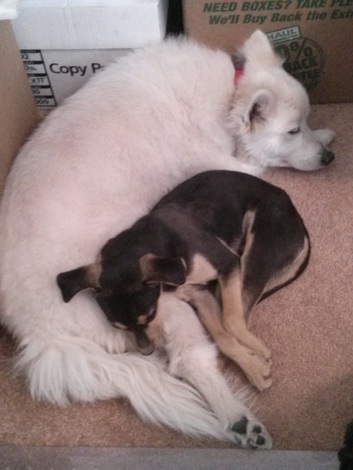














 RSS Feed
RSS Feed